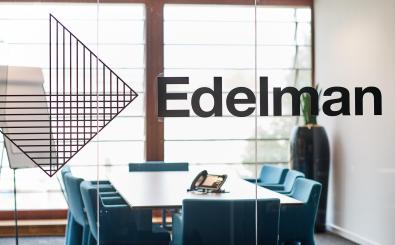Edelman Trust Barometer 2020 | Germany Evaluation Ethics and Competence: No Chance. German Institutions Do Not Meet Trust Criteria
-
Two central dimensions of trust: ethics and competence as a new benchmark
-
Germans are pessimistic: no social institution is considered to be both ethical and competent
-
Fear of the future: 73 percent of German employees worry about their jobs. Every second German believes technological change is happening too fast
Germans take a pessimistic view of their future. Just under one in four expect to be economically better off in the next five years (23%). Over half of them question capitalism (55 %) and the existing system (61 %). What's more, people in this country do not consider any of the four institutions – government, business, media and NGOs – to be both competent and ethical, meaning they doubt the two main criteria that are crucial for the creation of trust.
This is shown in the Germany evaluation of the 20th Edelman Trust Barometer. In it, Edelman surveyed over 34,000 people in 28 markets – including 1,150 people in Germany – about their levels of trust in societal institutions and examined what trust means to them.
"The two central questions are: Is an institution good in what it does, is it competent? And: do they do it ethically?" explains Christiane Schulz, CEO of Edelman Germany.
Competence and Ethics as Criteria for Trust
The results show that, in German people’s view, the competence of the economy comes out ahead (5 points on a competence scale of -50 to +50 points). Despite this low value, with a 55-point gap it is still miles ahead of the government, which comes in last with a score of -50 for competence. When we come to the trust pillar ‘ethics’, however, it is a different story. Economy (-14 points) and government (-18 points) are both clearly viewed as unethical. "The results paint a clear picture: companies must improve. Not in their value creation, value enhancement or as drivers of innovation, but in their ethics, i.e. in aspects such as fairness, credibility and their commitment to the future of our society," says Christiane Schulz.
Germans Demand Stronger Cooperation Between Institutions
This is reflected in another trend. 92 percent of Germans state that stakeholders (customers, employees and local environment) are more important for the long-term success of a company than shareholders. "The classic shareholder approach has had its day. In the future, companies must do more justice to the interests of their customers, employees and their regional environment," says Christiane Schulz.
But there's also good news: Every institution has a chance to improve its ethics and competence and thereby gain trust. Above all they can do this by acting together to solve central social problems. Only one in three Germans (33 percent) rates the current cooperation between companies and the government as positive, so there is still some catching up to do here. "This does not mean that companies have to become political. Rather, they must contribute to solving society's problems," says Christiane Schulz.
Fear of Job Losses
One issue that particularly concerns Germans is technological change. Half of Germans (50 percent) say that technological change is progressing at too fast a pace. 75 percent of the people in Germany believe that the government does not understand new technologies enough to regulate them effectively. Almost three out of four German workers (73 percent) are concerned they might lose their job due to automation or lack of future-relevant skills.
"A clear demand of the Germans: Companies must invest in further training their employees," says Christiane Schulz. 64 percent of those surveyed believe that companies have a duty to further train employees with an eye to automation and innovation. 75 percent of German employees say that CEOs in particular should be committed to this.
About the Edelman Trust Barometer
The Edelman Trust Barometer is an annual study on trust in governments, non-governmental organisations (NGOs), business and the media, and was conducted for the 20th time this year. The survey was developed by market-research company Edelman Intelligence and the data collection was carried out by means of 30-minute online interviews. The survey period was between 19th October and18th November 2019. 34,000 people were surveyed in 28 markets for the Edelman Trust Barometer 2020, including 6,200 from the informed public (people aged 25 to 64 with a university degree, an above-average household income (in the top 25 percent) and high media and information consumption). Further information can be found here.
Press Contact
Fabiola Lübbert
Tel.: +49 (0)221 828281-33
E-Mail: Presse-DE@edelman.com



